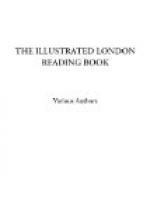[Illustration: ANCIENT ROMAN MILL.]
The first kind of poetry that was followed with any success among the Romans, was that for the stage. They were a very religious people; and stage plays in those times made no inconsiderable part in their public devotions; it is hence, perhaps, that the greatest number of their oldest poets, of whom we have any remains, and, indeed, almost all of them, are dramatic poets.
SPENCE.
* * * * *
CHARACTER OF JULIUS CAESAR.
[Illustration: Letter C.]
Caesar was endowed with every great and noble quality that could exalt human nature, and give a man the ascendant in society. Formed to excel in peace as well as war; provident in council; fearless in action, and executing what he had resolved with an amazing celerity; generous beyond measure to his friends; placable to his enemies; and for parts, learning, and eloquence, scarce inferior to any man. His orations were admired for two qualities, which are seldom found together, strength and elegance: Cicero ranks him among the greatest orators that Rome ever bred; and Quintilian says, that he spoke with the same force with which he fought; and if he had devoted himself to the bar, would have been the only man capable of rivalling Cicero. Nor was he a master only of the politer arts; but conversant also with the most abstruse and critical parts of learning; and, among other works which he published, addressed two books to Cicero on the analogy of language, or the art of speaking and writing correctly. He was a most liberal patron of wit and learning, wheresoever they were found; and out of his love of those talents, would readily pardon those who had employed them against himself; rightly judging, that by making such men his friends, he should draw praises from the same fountain from which he had been aspersed. His capital passions were ambition and love of pleasure, which he indulged in their turns to the greatest excess; yet the first was always predominant—to which he could easily sacrifice all the charms of the second, and draw pleasure even from toils and dangers, when they ministered to his glory. For he thought Tyranny, as Cicero says, the greatest of goddesses; and had frequently in his mouth a verse of Euripides, which expressed the image of his soul, that if right and justice were ever to be violated, they were to be violated for the sake of reigning. This was the chief end and purpose of his life—the scheme that he had formed from his early youth; so that, as Cato truly declared of him, he came with sobriety and meditation to the subversion of the republic. He used to say, that there were two things necessary to acquire and to support power—soldiers and money; which yet depended mutually upon each other: with money, therefore, he provided soldiers, and with soldiers extorted money, and was, of all men, the




